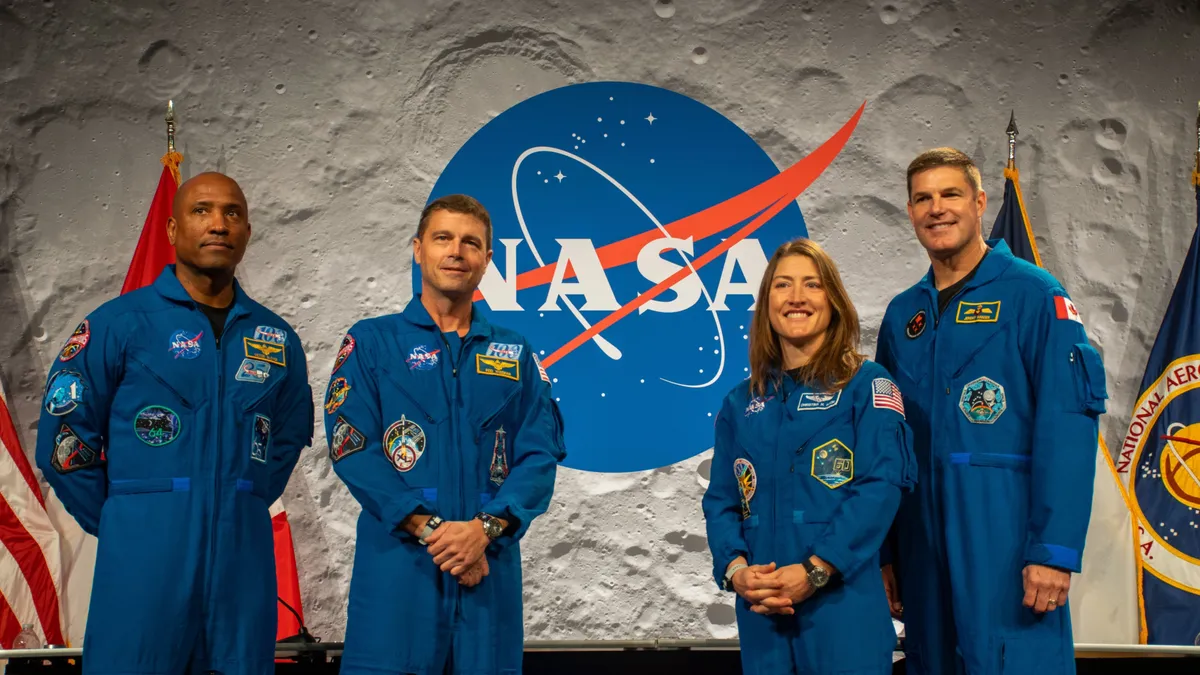
HOUSTON — The excitement is palpable among the four astronauts of NASA's Artemis 2 mission as they prepare for their groundbreaking journey to the moon, scheduled to launch as early as February 5, 2024. This mission marks the first crewed lunar flight in over 50 years, and the team is currently undergoing rigorous training to ensure their readiness for this historic event.
The Artemis 2 astronauts will ascend aboard NASA's colossal Space Launch System (SLS) rocket, flying in an Orion spacecraft aptly named "Integrity." During a press conference at NASA's Johnson Space Center (JSC) on September 24, Artemis 2 commander Reid Wiseman emphasized their commitment to executing the mission flawlessly. "We're going to launch when this vehicle is ready, when this team is ready, and we're going to go execute this mission to the best of our abilities," Wiseman stated. He highlighted the mission's significance, noting that while their destination is the moon, it serves primarily as a test mission to prepare for future explorations.
Joining Commander Wiseman on this historic 10-day mission around the moon are pilot Victor Glover, mission specialist Christina Koch, both from NASA, and Canadian Space Agency astronaut Jeremy Hansen, also serving as a mission specialist. This mission has been decades in the making since NASA first announced plans for a crewed return to the moon in 2004, setting the stage for even more ambitious upcoming missions, including Artemis 3, which aims to land astronauts on the lunar surface.
Artemis 2 will achieve several important milestones, including being the first crewed lunar flight since the iconic Apollo program, as well as the first mission to send both a woman and a person of color into lunar space. This mission not only aims to land humans on the moon but also to enable sustained crewed exploration of the lunar south pole, paving the way for future missions to Mars.
Another remarkable aspect of Artemis 2 is the potential for the mission to take astronauts as far as 9,000 miles (14,500 kilometers) beyond the moon, marking the farthest journey into deep space by humans since the Apollo missions. During the press conference, Glover expressed the importance of focusing on their immediate responsibilities rather than the grandeur of the mission. "If we want to live up to the standards that we owe the American and Canadian public and humanity in general, we have to be able to focus and know what the next right thing is to do," he remarked.
Koch shared a similar sentiment, reflecting on a recent conversation with Fred Haise, the lunar module pilot of Apollo 13. "He said, 'I heard you're going to beat our record,' which made me realize that sometimes we may inadvertently ignore the real story of what's going on in our mission," she explained. Koch emphasized that the essence of their mission lies in the push to return to the moon and conduct modern scientific research on human adaptation to deep-space travel, ultimately preparing for future missions to Mars.
While some crew members are seasoned space travelers, with Koch holding the record for the longest single spaceflight by a woman at 328 days aboard the International Space Station (ISS), Artemus 2 marks the first journey to space for Hansen. "It truly is an absolute privilege," he said, noting that for the Artemis 2 crew, this mission transcends simply returning to the moon; it embodies the pursuit of excellence.
Signs at the JSC highlight the impending launch, counting down to D-Day with messages like "20 weeks away!" NASA aims to launch Artemis 2 between early February and April 26, 2024. Although there have been delays due to concerns regarding the heat shield performance of the Orion spacecraft during Artemis 1's reentry, the agency is determined to move forward.
Nasa's Acting Administrator Sean Duffy stressed the significance of the Artemis program in maintaining the United States' competitive edge in the international space arena, particularly in relation to China. "I'll be damned if the Chinese beat NASA, or beat America, back to the moon," Duffy remarked, highlighting the importance of competition in the ongoing space race.
Hansen acknowledged the perception of a race but emphasized that the mission's international collaboration is a significant advantage. He stated, "We're just going to pursue excellence; that's how you win a space race." Glover echoed this sentiment by focusing on the collaborative efforts of the Artemis missions, highlighting that success depends on teamwork and the seamless transition of responsibilities towards Artemis 3, which aims to set the stage for a return to the lunar surface.
As the Artemis 2 crew prepares for their historic journey, the world watches with anticipation, eager to witness the next chapter in human space exploration.